Increasing gender equity by supporting parents
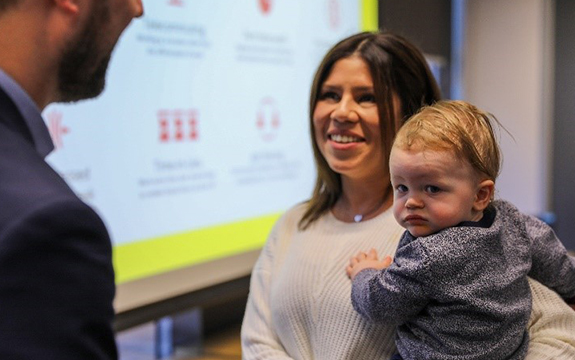
In Summary
- Swinburne encourages parents of all genders to take advantage of paid parental leave and flexible work arrangements
- To help with the transition back to work, Swinburne also offers parents’ rooms, childcare options, school holiday programs and initiatives to help new parents reconnect with colleagues
- Programs are part of Swinburne’s commitment to inclusion and increasing gender equity
With the most recent data from the Australian Bureau of Statistics showing that only one in 20 Australian fathers take primary parental leave, Swinburne has made a concerted effort to encourage parents of all genders to make the most of paid parental leave and flexible work arrangements.
In 2016, as part of its commitment to workplace gender equity, Swinburne was one of the first Australian universities to replace maternity and paternity leave with gender-neutral parental leave. Eligible staff can receive up to one year’s paid leave and an additional year of unpaid leave.
Nine men at Swinburne have taken parental leave following the birth or adoption of a child since October 2016, and it is hoped this number will continue to increase.
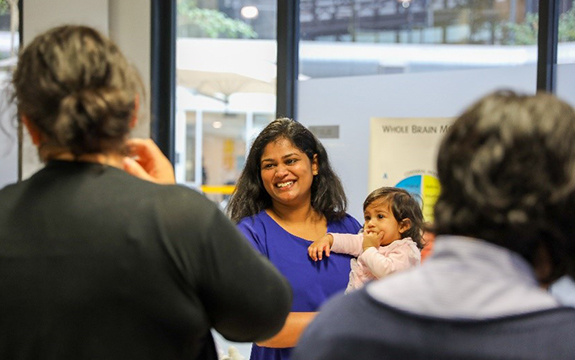 New parents reconnect with colleagues at the Connections morning tea.
New parents reconnect with colleagues at the Connections morning tea.
Helping parents re-enter the workforce
Swinburne recognises that helping parents transition back into work is equally important. As a result, Swinburne offers parents’ rooms on all campuses, childcare options, school holiday programs and initiatives to help new parents reconnect with colleagues, such as the biannual ‘Connections’ morning tea.
The most recent Connections event was hosted by Swinburne’s Vice President (People and Culture), Marcia Gough in August. It was attended by more than 30 team members of all genders and 14 children.
“It was wonderful to have so many people attend – from staff soon to go on leave, people currently on leave and those recently returned from leave,” says Ms Gough.
“They came to hear about leave options, flexible working and the return to work program, and to generally network with others across the organisation in a similar situation. Many managers attended, creating opportunities for colleagues to speak directly about their experiences and how they are addressing any challenges.”
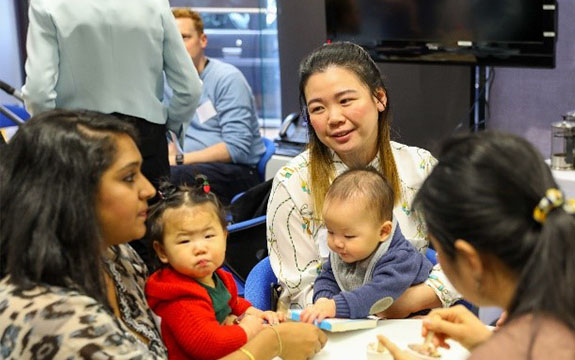 Parents had the opportunity to network and share their experiences with flexible working at Swinburne.
Parents had the opportunity to network and share their experiences with flexible working at Swinburne.
Among those at the morning tea was Manager of International Business Development, Michelle Hosemann. She learned she was pregnant soon after starting at Swinburne and was pleasantly surprised to find she was eligible for parental leave.
Ms Hosemann made use of flexible work arrangements to work from home towards the end of her pregnancy and has now returned to work part-time. She felt the Connections event was a useful way to find out about the other programs available to Swinburne staff, as well as to connect with other parents.
“I have worked at other universities, but Swinburne go above and beyond in what they offer. Swinburne is very family-friendly and that was one of the key factors I considered when joining,” Miss Hosemann says.
Swinburne recognises that the experience of transitioning back to work can vary significantly from person to person, with some managers more readily adapting the provisions than others. A handbook explaining parental leave processes plus online resources covering flexible work arrangements are available to help staff and managers understand the options.
The university also offers year-round, on-site childcare and has parents’ rooms at its Croydon, Hawthorn and Wantirna campuses, as well as a popular school holiday program at Hawthorn.
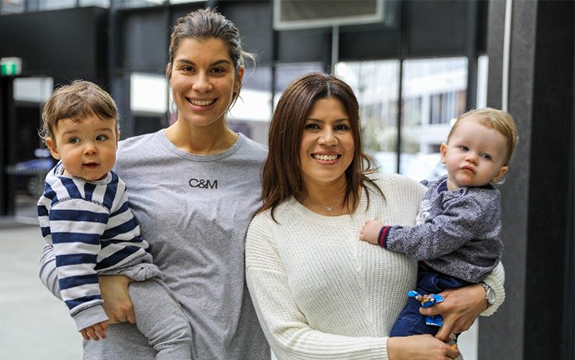 Swinburne recognises that the experience of transitioning back to work can vary significantly from person to person.
Swinburne recognises that the experience of transitioning back to work can vary significantly from person to person.
Supporting fathers
Swinburne actively encourages men to take primary caregiver leave and make the most of flexible work arrangements.
Associate Professor Alan Duffy from Swinburne’s Centre for Astrophysics and Supercomputing took primary caregiver leave when he and his wife Sarah welcomed their first child Mia in 2018. He took one month off after the birth and then a further six months up to Mia’s first birthday.
“I am incredibly grateful and indeed proud that Swinburne has a gender-neutral policy of parental leave,” Associate Professor Duffy says.
“This time with Mia was of fundamental importance to me as a parent and partner. My wife Sarah and I had a greater shared understanding of what was best for our daughter in terms of her care, and also a more equitable experience in terms of our careers. It’s something I would recommend all my colleagues consider taking,” he says.
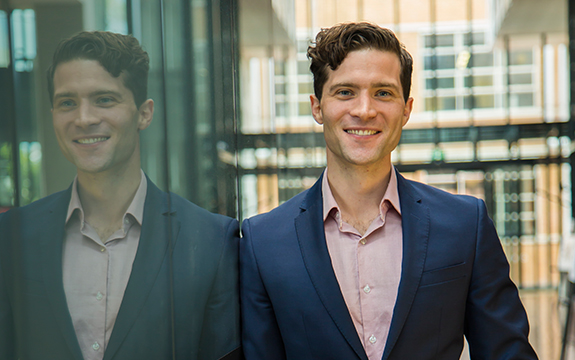 Associate Professor Alan Duffy welcomed his first child Mia in 2018.
Associate Professor Alan Duffy welcomed his first child Mia in 2018.
The Engineering Practice Academy’s Operations Manager Dr Tim Smith is fully supportive of his team members taking parental leave, including Chief Maker Eddie Brelsford who is currently on primary caregivers’ leave.
“It’s fairly uncommon for the male partner to take the primary carer leave, but I’m so glad that Eddie did,” Dr Smith says.
“Everyone should be taking parental leave when they have a new addition to the family and I am happy to support any of my team wanting to take advantage of this opportunity.”
Swinburne’s Vice-Chancellor and President, Professor Linda Kristjanson AO, says offering the same leave entitlement and flexible work arrangements to staff regardless of gender is part of the university’s commitment to increasing gender equity.
“Swinburne is committed to fostering a culture of gender equity and inclusion. We value the strength that diversity brings, as well as the programs and initiatives that support our gender equity goals,” Professor Kristjanson says.
“Our goal is to be Australia’s leading university for inclusion, and Swinburne’s focus on gender equality including gender-balanced parental leave is just one aspect of this. While we are proud of our success, we also know there is more work to do,” Professor Kristjanson says.

